A Boy Named Bayani
Bayani and the ABCs of Me is the first picture book about a Filipino child with autism.
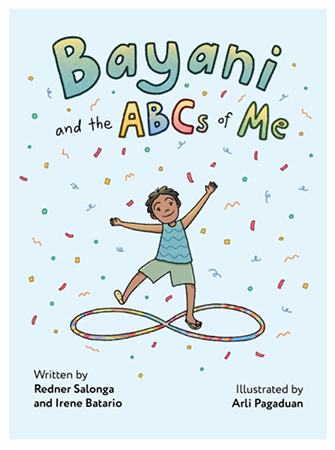
Bayani and the ABCs of Me is a picture book about a Filipino child with autism.
“Bayani and the ABCs of Me was written for the autistic and disabled in the Filipino community. We want our readers to know that they are valued and seen. We also want people who may not be Filipino to understand a bit about our culture and the values that we strongly believe in,” explains Irene Batario (Tita Irene) who co-authored with Redner Salonga (Kuya Red).
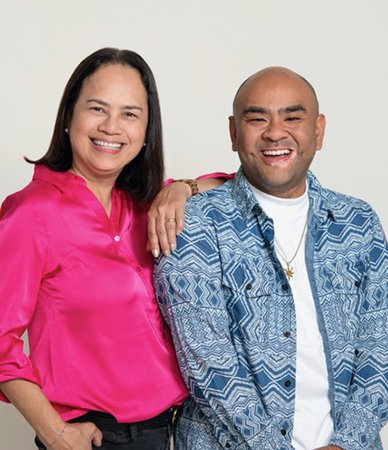
Irene Batario and Redner Salonga are the authors of Bayani and the ABCs of Me. They are both Behavior Analysts based in Jacksonville, Florida. (Photo by Agnes Lopez Photography)
They are both from Jacksonville, Florida and are active members of the Filipino community. “We met each other over ten years ago when we worked together at a Special Education school,” Salonga says. Their personalities clicked and they’ve been inseparable ever since.
They create content for the social media channel @titaandkuya. The founding board members of Jax Filipinos, a non-profit organization forging connections through outreach, arts, and education also established Autism Pamilya.
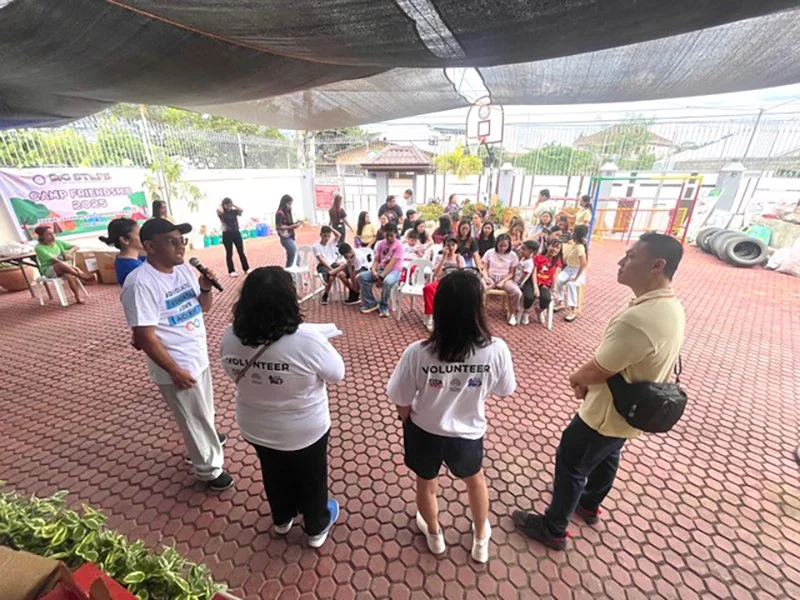
Authors Redner Salonga and Irene Batario are the founders of Autism Pamilya that provides resources for Filipino families within the autism and special needs community. (Photo courtesy of Irene Batario and Redner Salonga)
Bayani and the ABCs of Me came to fruition as they started their community organization, Autism Pamilya. During the pandemic, they began creating social media content celebrating Filipino culture and creators. As the years progressed, they discussed further giving back to the community. This is how Autism Pamilya started. It’s their way of connecting with the autistic and disabled community providing resources and support both locally and internationally
“Bayani's story came from conversations with autistic Filipinos who shared that there were no stories about them growing up. We wanted to change that. We wanted this first book to focus on introducing Bayani,” Salonga says.
“We hope our future books continue to share Bayani and autistic experiences in meaningful ways. In our books, we want to be sensitive to the autistic community and we will always get feedback directly from them,” adds Batario.
Through Autism Pamilya, they have participated in several projects with their Philippine partner, Autism PH, a community of autistic families that support one another through education and events. They recently had their first outreach in the Philippines centering on "HopeKits," where they delivered over 400 relief bags to the Big Steps special education center in Nueva Ecija. These relief bags assist autistic and disabled families during natural calamities. They contain first aid supplies, non-perishable food, and social stories explaining natural disasters.
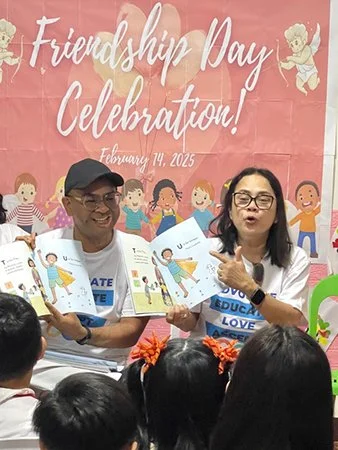
Authors Redner Salonga and Irene Batario read Bayani and the ABCs of Me during their outreach program in Nueva Ecija, Philippines. (Photo courtesy of Irene Batario and Redner Salonga)
A percentage of all sales from Bayani and the ABCs of Me will help fund future Autism Pamilya projects. Their next goal is to help Big Steps build a sensory room at their school. Students can use this room to calm and regulate themselves.
Batario is a Board-Certified Behavior Analyst. She helped start the Jacksonville School for Autism. “I encouraged Michelle Dunham, the school’s Executive Director, to begin developing the model that would later become the school, which is now celebrating its 20th year.”
She likewise helped develop the program of PIECES Child Development Services. “It is now the leading learning clinic in the Philippines that utilizes the science of Applied Behavior Analysis (ABA),” she says proudly.
As a Job Coach, she also helps autistic and disabled students transition from school to real life. She explains, “I focus on identifying each student's strengths and interests to help them find meaningful employment opportunities. This includes teaching essential workplace skills, providing hands-on training, and fostering independence through structured routines and real-world experiences. I also work closely with employers to educate them on how to support neurodivergent employees, ensuring a successful and inclusive work environment. Seeing these students grow in confidence, gain independence, and find purpose in their work is incredibly rewarding. Watching them thrive — whether by mastering new skills, earning their first paycheck, or simply feeling valued in their workplace — is a constant reminder of why this work is so important. It’s not just about getting a job; it’s about giving them the opportunity to be contributing members of society and leading fulfilling lives.”
“Bayani's story came from conversations with autistic Filipinos who shared that there were no stories about them growing up.”
Salonga is also a Board-Certified Behavior Analyst and a flight attendant with Delta Airlines, each skillset going hand in hand. He says, “I think being a Behavior Analyst brings a different perspective as a flight attendant. It gives me greater empathy for passengers, especially families. I've shared my experiences with fellow flight attendants, reminding them that autism is a hidden disability, so you may think that a child is just acting spoiled when in fact that child may have autism and their parents are doing their best to calm their child in the moment. I would advise passengers to have the same mindset. You truly don't know what people are going through and it's better to ask how you can help rather than making judgments based on what you see. Delta does a great job helping the autism and disabled community. I hope to further improve that experience for them.”
They both say, “The autism community is very near and dear to us. We have relatives and friends who have autistic children, so it definitely hits home. However, there is very little representation here in the U.S. and we hope that our book opens more doors.”
Arli Pagaduan is the Philippines-based illustrator of Bayani and the ABCs of Me, whose images were drawn digitally in close collaboration with the authors. She says, “I asked them for resources on autism and watched videos to have a clearer idea of what it's like. We started with character designs followed by rough sketches. Their feedback let me know if these were appropriate and could easily be understood by kids. Take for example the illustration on the page featuring the letter T. On the wall are “I feel happy” and “I feel sad” posters. The rough sketch originally used the sun and cloud as metaphors, but Autism Pamilya said that they should literally show a happy and sad face because some kids might not fully understand the metaphor. Once the rough sketches were approved, we moved onto line art, coloring, and layout. I made the colors gentle on the eyes and each page to be neat and clean.”
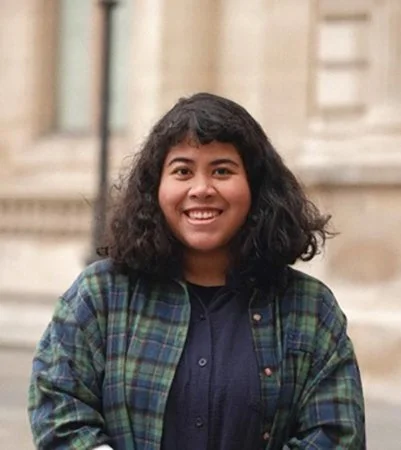
Arli Pagaduan is the illustrator of Bayani and the ABCs of Me. She always aims "To create art that is life-giving." (Photo by Vincent Paolo Naval)
Pagaduan learned how important words are. “I wanted the way I address to be correct and respectful. Some people in the autism community prefer being called ‘a person with autism’ or ‘a person on the autism spectrum,’ but some prefer identity-first language (an autistic person), because I read that the former suggests that autism is like an illness, and it isn’t! It’s better to ask the person how they want to be addressed. The book also reaffirms how truly unique we all are — from the way we think, see the world, communicate, and react to various experiences. We must be patient, understanding, kind, inclusive, and keep working on having safe spaces for everyone to be themselves,” exclaims Arli.
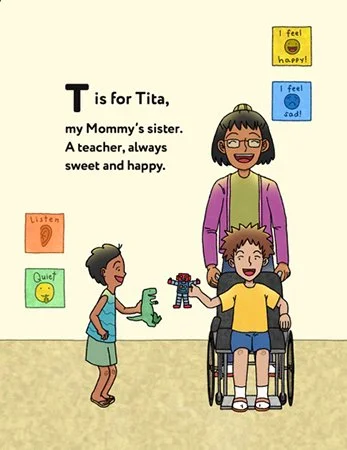
A page from Bayani and the ABCs of Me. "On the wall are happy and sad posters. The rough sketch originally used the sun and cloud as metaphors, but revised to literally show a happy and sad face because some kids might not fully understand the metaphor,” explains illustrator Arli Pagaduan. (Photo courtesy of Arli Pagaduan)
Tita Irene and Kuya Red emphasize that Autism is a lifelong developmental disability that affects how a person communicates, interacts with others, learns, and behaves. Simply put, autism affects the brain and processes how autistic persons experience the world differently.
“It is important for people to know that neurodiversity is a beautiful thing and if you truly want to understand autism, then it is important to connect with the community and hear from autistic persons’ experience themselves,” Batario says.
Both encourage cultivating a nurturing environment. “Autistic persons may communicate in various ways, but they are intelligent and will communicate using their preferred way. As Filipinos, we are very hospitable by nature. Let’s use the same caring approach. Have a listening ear, be sensitive to their needs or wants, and always show them respect,” Salonga stresses.
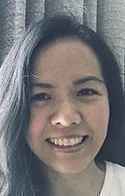
Claire Mercado-Obias is a writer, food stylist and pastry chef based in New Jersey.
More articles from Claire Mercado-Obias



No comments: